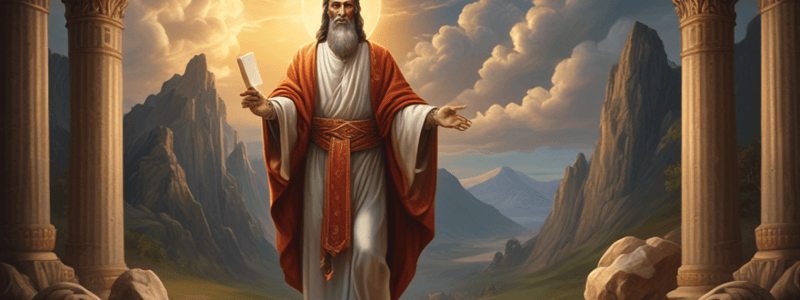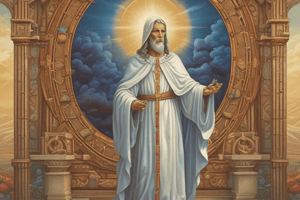Podcast
Questions and Answers
In Matthew 5, Jesus corrects what has been misunderstood of the law, claiming absolute authority over the laws and institutions of God.
In Matthew 5, Jesus corrects what has been misunderstood of the law, claiming absolute authority over the laws and institutions of God.
True (A)
Jesus' authority over the temple in Matthew 12 verse 6 is seen as less than the temple itself.
Jesus' authority over the temple in Matthew 12 verse 6 is seen as less than the temple itself.
False (B)
According to the Old Testament, the temple is not considered God's dwelling place.
According to the Old Testament, the temple is not considered God's dwelling place.
False (B)
Jesus' attributes, as described in the scripture, do not mark him out as divine.
Jesus' attributes, as described in the scripture, do not mark him out as divine.
Jesus did not claim to be omnipresent in the scripture.
Jesus did not claim to be omnipresent in the scripture.
The scripture does not provide scriptural evidence of Jesus' divinity.
The scripture does not provide scriptural evidence of Jesus' divinity.
Jesus' divine claims are not supported by his actions and teachings in the scripture.
Jesus' divine claims are not supported by his actions and teachings in the scripture.
The four major proofs of Jesus' divinity do not include his works, claims, and attributes.
The four major proofs of Jesus' divinity do not include his works, claims, and attributes.
According to the author, Jesus' words in Luke 7 were not well known to the people.
According to the author, Jesus' words in Luke 7 were not well known to the people.
The author mentions that only God can forgive sins, implying that Jesus is not God.
The author mentions that only God can forgive sins, implying that Jesus is not God.
The author argues that the religious background of the day is compatible with the presentation of Christ.
The author argues that the religious background of the day is compatible with the presentation of Christ.
The author cites Brash Bansal's book, The Person of Christ, Volume 2, as a source of inspiration.
The author cites Brash Bansal's book, The Person of Christ, Volume 2, as a source of inspiration.
The author makes a distinction between direct and indirect evidence of Jesus' deity.
The author makes a distinction between direct and indirect evidence of Jesus' deity.
The passage suggests that Jesus' claim to deity was not evident in his words and actions.
The passage suggests that Jesus' claim to deity was not evident in his words and actions.
The author believes that the miracle of the costly perfume in Luke 7 is a direct evidence of Jesus' deity.
The author believes that the miracle of the costly perfume in Luke 7 is a direct evidence of Jesus' deity.
According to Doriani, Jesus explicitly claimed to be divine in his parables.
According to Doriani, Jesus explicitly claimed to be divine in his parables.
The author points out Jesus' knowledge of people's thoughts as an indication of his divine power.
The author points out Jesus' knowledge of people's thoughts as an indication of his divine power.
The article 'Jesus' implicit claim to deity in his parables' provides 12 bullet points summarizing the evidence for Jesus' divinity.
The article 'Jesus' implicit claim to deity in his parables' provides 12 bullet points summarizing the evidence for Jesus' divinity.
Jesus taught that his life was a pattern for others to follow.
Jesus taught that his life was a pattern for others to follow.
Denying Jesus' divinity is a form of Gnosticism.
Denying Jesus' divinity is a form of Gnosticism.
The completeness of Jesus' humanity is denied in Doceticism.
The completeness of Jesus' humanity is denied in Doceticism.
Doriani's article discusses the significance of Jesus' resurrection.
Doriani's article discusses the significance of Jesus' resurrection.
Scriptural evidence of Jesus' divinity can be found in his parables.
Scriptural evidence of Jesus' divinity can be found in his parables.
Worship and adoration of Jesus during his lifetime are mentioned in the article.
Worship and adoration of Jesus during his lifetime are mentioned in the article.
The disciples would not have realized that Jesus was incredibly different from mankind.
The disciples would not have realized that Jesus was incredibly different from mankind.
The Bible states that Jesus created and sustains all things.
The Bible states that Jesus created and sustains all things.
The Bible does not attribute divine names to Jesus.
The Bible does not attribute divine names to Jesus.
Francis Beckwith's syllogism does not rely on scripture to prove Jesus' divinity.
Francis Beckwith's syllogism does not rely on scripture to prove Jesus' divinity.
Only pagan gods are credited with creating the heavens and the earth.
Only pagan gods are credited with creating the heavens and the earth.
The Bible does not describe Jesus as the one who formed the earth by his power.
The Bible does not describe Jesus as the one who formed the earth by his power.
The Bible describes Jesus as having limitations similar to those of pagan gods.
The Bible describes Jesus as having limitations similar to those of pagan gods.
The heavens were made by the word of Jesus, according to scripture.
The heavens were made by the word of Jesus, according to scripture.
The article 'God the Son' by John Fish III is a 50-page article on the deity of Jesus Christ.
The article 'God the Son' by John Fish III is a 50-page article on the deity of Jesus Christ.
In the article, Jesus is described as being sent from heaven by the Holy Spirit.
In the article, Jesus is described as being sent from heaven by the Holy Spirit.
The article mentions that Jesus spoke the words of the Holy Spirit, not his own.
The article mentions that Jesus spoke the words of the Holy Spirit, not his own.
The passage suggests that Jesus claimed to be the exclusive revelation of the Holy Spirit.
The passage suggests that Jesus claimed to be the exclusive revelation of the Holy Spirit.
The article states that Jesus has all things given into his hand by the Holy Spirit, including the judgment of the world and the granting of eternal life.
The article states that Jesus has all things given into his hand by the Holy Spirit, including the judgment of the world and the granting of eternal life.
The Son of God is described as being independent of the Father for guidance and strength.
The Son of God is described as being independent of the Father for guidance and strength.
The article mentions that Jesus' divinity is evident in his words and actions.
The article mentions that Jesus' divinity is evident in his words and actions.
The article is from a well-known journal in the author's circles.
The article is from a well-known journal in the author's circles.
Flashcards are hidden until you start studying
Study Notes
The Deity of Christ
- Christ's divine claims, authority, and works mark Him as something different from the law in Matthew 5.
- In Matthew 5, Jesus corrects what has been misunderstood of the law, speaking with remarkable authority (e.g., "You have heard that it was said, but I say to you..."); this authority would be immediately recognized by the Jewish rabbis and others of the day.
Authority over the Temple
- In Matthew 12:6, Jesus claims to be greater than the temple, which was considered God's dwelling place in the Old Testament; only God Himself could make such a claim.
Attributes of Christ
- Christ's attributes, such as His presence as the living Word, mark Him as divine.
- He is greater than the temple and is omnipresent, as evidenced by His statement after His ascension.
Indirect Evidence of Christ's Deity
- Luke 7: Jesus forgives sins, which is a divine prerogative, implying that He is God.
- Jesus' words and actions in Luke 7 demonstrate His divine power, as He knows the thoughts of others.
Further Testimony to Christ's Deity
- The chart in Doriani's article "Jesus' Implicit Claim to Deity in His Parables" (Trinity Journal, Spring 1991) provides a useful summary of the evidence for Christ's deity.
Heresies Regarding Christ
- Six basic heresies regarding Christ:
- Ebionism: denies Christ's deity
- Arianism: denies the completeness of Christ's deity
- Docetism: denies the genuineness of Christ's humanity
- Pollinarianism: denies the completeness of Christ's humanity
- Historicism: divides Christ's person
- Eutichianism: confuses Christ's nature
Divine Works of Christ
- Christ's divine works are those that only God could do, such as creating and sustaining all things (Colossians 1 and Hebrews 1:2-3).
- Francis Beckworth's syllogism (JETS, December 1986) points to scripture passages that demonstrate Christ's role in creation (e.g., Isaiah 44:24, Nehemiah 9:6, Isaiah 45:18).
Studying That Suits You
Use AI to generate personalized quizzes and flashcards to suit your learning preferences.




